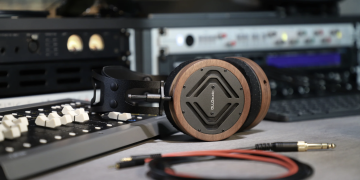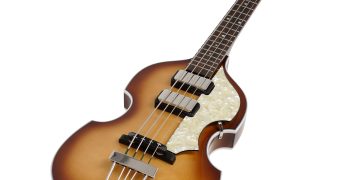 The Stratotone trademark dispute between Darryl Agler and Westheimer Corporation is headed back to court, after Westheimer appealed the original decision which went in favour of Agler.
The Stratotone trademark dispute between Darryl Agler and Westheimer Corporation is headed back to court, after Westheimer appealed the original decision which went in favour of Agler.
“Westheimer Corp. has appealed the decision and we expect to be fully vindicated when the appellate court rules in our favour,” said Westheimer president, Larry Goldstein.
Agler argued that the trademark had been out of use for so long that it had passed into the public domain by the time he started using it in 2008, which the judge in the Northern Indiana District Court upheld, a decision which is still contested by Westheimer.
Court documents for the case describe the facts like this:
“In 1953, the Harmony Guitar Company, one of the country’s major producers of guitars, began selling a line of guitars known as Stratotones. That name appeared on the head of the guitars, and below that appeared a logo resembling an atom with a music note in the middle (the Atom mark).
“The Harmony Guitar Company ceased its sale of those guitars in the mid-1960s, and it went out of business in the mid-1970s. In 2000 or 2001, a company named M.B.T. International acquired a license to market reissues of instruments originally sold by the Harmony Guitar Company, including the Stratotone. Thomas Malm was the Vice-President and General Manager of the Harmony product line at MBT at the time. He testified that MBT was in “the very early stages of a slow ramp up” of sales, but that Harmony guitars including Stratotones were being shipped to retailers and were being sold to the public.
“There is some dispute as to who licensed those products to MBT, though. Mr. Malm testified that MBT licensed the products from a company that belonged to Charles Subecz, who was the president of Harmony Industries, Inc.—an entity distinct from the Harmony Guitar Company. Other evidence indicates that MBT’s license was from a company named Global Musical Instrument Company, Inc., which had purchased certain assets from the Harmony Guitar Company when it went out of business.
“In either event, MBT’s sales of the guitars were rather short-lived, as it terminated its license and ceased its sales at some point in 2001, or possibly 2002. After MBT terminated its license, Mr. Subecz and Mr. Malm, who left MBT in July 2001, began working together to bring the guitars back to the market on their own. They developed samples of the guitars and worked with manufacturers on producing them, and were nearly ready to begin selling the guitars. At that point, however, MBT sent a cease and desist letter and threatened suit, claiming that it owned certain artwork associated with the guitars. Mr. Subecz had previously spoken to Mr. Malm about his experience being involved in a lawsuit over a brand, and said that “if anything like that ever happens again, he’s pulling the plug and he’s not going to be involved.” Consistent with those remarks, Mr. Subecz dropped the project as soon as MBT threatened suit, and he and Mr. Malm parted ways in 2002.
“Several years later, Darryl Agler, the plaintiff in this action, became interested in producing reissues of Stratotone guitars on his own. On March 7, 2006, he filed an application with the United States Patent and Trademark Office to register “Stratotone” as a trademark based on his intent to use the mark. He has not, nor has any other party, applied to register the Atom mark, though. Mr. Agler then began custom-building and selling several Stratotone guitars a year, though there is some question as to when those sales commenced. After he successfully defended his trademark application against an objection, the Stratotone mark became registered to Mr. Agler on the Principal Register of the Patent and Trademark Office on June 28, 2011.
“In the meantime, Harmony Industries resumed activity relative to the Stratotone brand. On March 13, 2007, Harmony Industries filed an intent-to-use application to register the Stratotone mark, but that application was denied based on Mr. Agler’s earlier-filed application.
“In addition, in January 2008, Harmony Industries announced its own release of Stratotone guitars, and it displayed them at an industry trade show. Then, in February 2009, Westheimer Corporation, the defendant in this action, purchased all of Harmony Industries’ assets and good will, which would include any interest it may have had in any protectable marks. Westheimer then began production of Stratotone guitars on its own behalf and began selling the guitars in 2009.
“In light of these competing uses of the same marks on the same products, Mr. Agler initiated this action on March 27, 2014. He filed an eight-count complaint against Westheimer, asserting both state and federal claims arising out of Westheimer’s use of the Stratotone mark (but not the Atom mark), including claims for unfair competition, trademark infringement, and trademark counterfeiting, among others. Westheimer responded by asserting counterclaims against Mr. Agler, alleging that he was infringing on its rights in both the Stratotone and Atom marks. Westheimer also sought cancellation of Mr. Agler’s registration of the Stratotone mark.”
You can read a full summary of the court documents here.



























